Coping Mechanisms
Farthest Away Sound, Journalistic Theater in a Rural County, and the power of Community, which Does
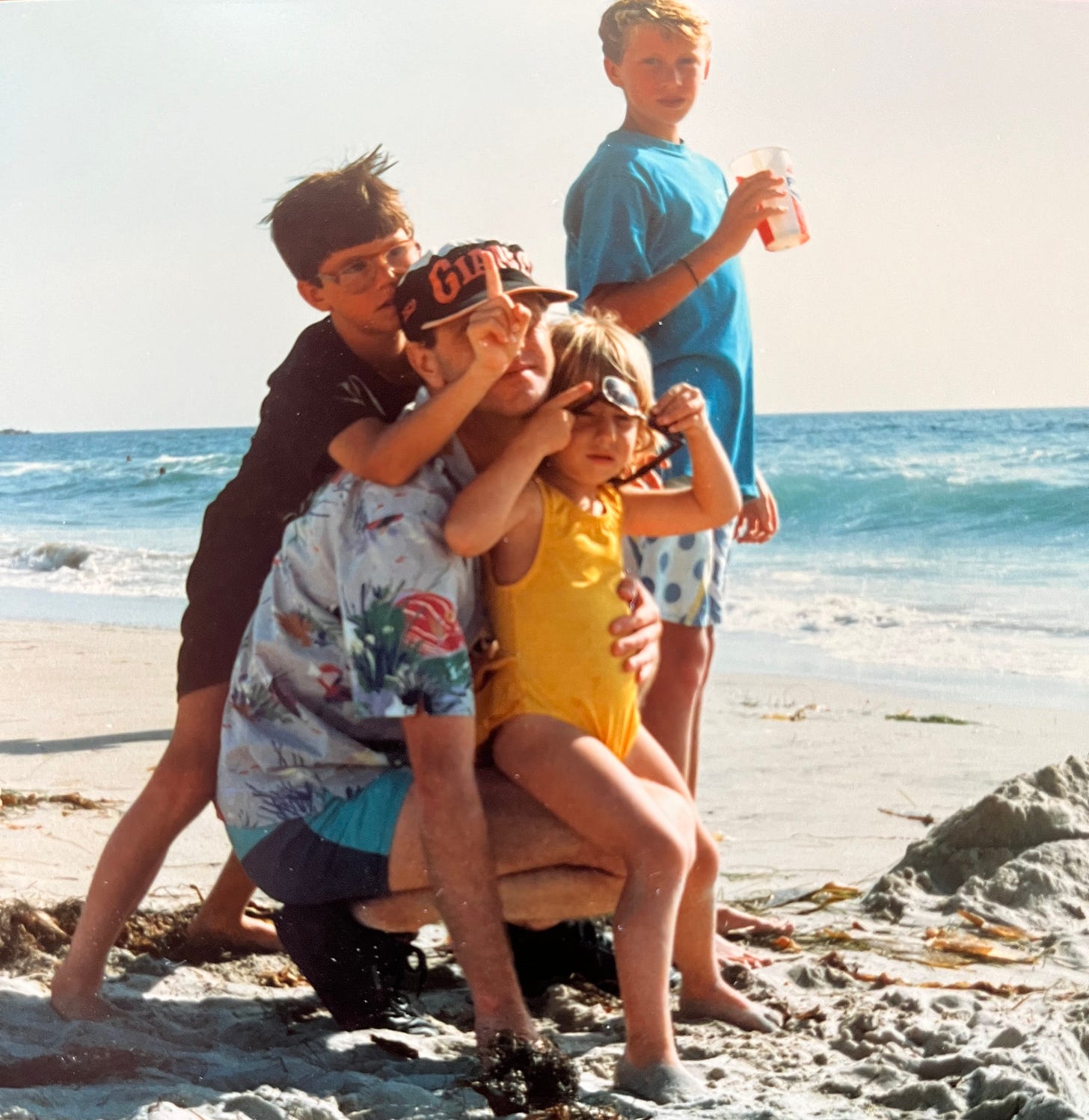
When I was a kid, my Dad would play a game with me and my big brother and little sister. On a picnic in Dolores Park, or on a park bench in Golden Gate Park, or just in our backyard on Potrero Hill, he’d abruptly say, “What’s the farthest away sound you can hear?” And we’d all be quiet for half a minute. And we’d strain to hear…. a whoosh of freeway traffic. Or the clang of a Muni bus’s electric hook-ups coming off. Sometimes an airplane’s low thrum. Not exactly quaint British countryside sounds.
Sometimes we could hear the crash of ocean waves, or a far-off high school band practice. And sometimes it would attune us to nearby sounds—a neighbor cleaning their garage and singing, a car idling with the door open and the stereo playing, a mother cooing to her baby. Little slices of life that would take us out of our world and into theirs.
It was a shrewd parenting move, no doubt. A way to calm the hub bub of three kids. (Graham Greene’s dry summation: “children are noisy” is comic succor when my kids get loud these days). Yet it was also a grounding exercise. A way to get outside oneself.
I’ve been staying at a cabin in Mendocino County while working on a piece of Journalistic Theater at Mendocino College that premiered last weekend. Normally a quiet morning alone is a revelation. Yet with the dark churn of political events, the ongoing assault on the humanities, a President brazenly ignoring court rulings, it can be uncomfortable to be alone with my thoughts. This is a jarringly new experience. Though I thrive on connecting deeply with strangers, I also love solitude.
So when I played the Farthest Away Sound game alone, and really listened closely, the sounds flooded in like sweet relief. The rising squawks of quail, like a cartoon soundtrack of 18th century lawyers talking over each other. A lone rooster’s crow reminding me of childhood mornings at Cynthia’s in Carmel Highlands, the aphoristic matriarch who’d dole out sweet cereal and old comic books. On this warm morning, feeling that sweet cool but not cold air, a promise that today will be warm— a connection to past mornings of promise. Chicago in June on my bike riding to Wrigley Field to sell beer, drip with sweat, hustle for tips, crack jokes and fill the iconic role of plucky beer salesman to half-drunk Midwesterners. Listening becomes a coping mechanism. A meditation. An escape from negative spirals of thoughts.
One of the many books that had an influence on my new show Takes All Kinds was Anand Ghirihadras’ The Persuaders. It profiles a half dozen people and organizations who are in different ways trying to win hearts and minds. For my research, I went even more granular, and found relatively untold stories of unlikely community changemakers.
And for all of them, listening is an essential part of the battle plan. In order to storm the castle, one has to know the lay of the land. Listening in and of itself is not the goal. The goal is to persuade, to open up, to shine a light on, to illuminate a different path forward. Sure it’s a humane practice, but it is also a strategy.
I have many friends who understandably say, “I don’t want to listen as our country descends into authoritarianism. I want to know what the hell is wrong with all these people!” Certainly, it is a bewildering experience to watch Elon Musk at a cabinet meeting, his hands held in faux-intellectual spread with fingers touching, his black on black MAGA hat arched high on his head, joking about the thousands of federal employees he’s about to fire. Trump, the baggy old carnival barker, muttering his approval. If only it were Kubrick’s Dr. Strangelove and George C. Scott would bust in with a manic grin.
With the detention of a Greencard holder for constitutionally respected free speech, it’s impossible to ignore that we are in new territory. My Dad was a Greencard holder when my Mom was 8 months pregnant with my brother in 1977, and with me in 1980, and my sister in 1984. And yes he was a Greencard holder when one night he launched into the famous Doorstop Monologue.
It was about honoring the dignity of work, of the guy who makes even the simple doorstop. But there were pointed broadsides against the indignities of American capitalism. I was ten years old, and burst into tears. My Dad felt bad, and apologized. And told me it’s fine if I just want to go get ice cream. But I wasn’t overwhelmed by the rant. I was moved by the specter of injustice.
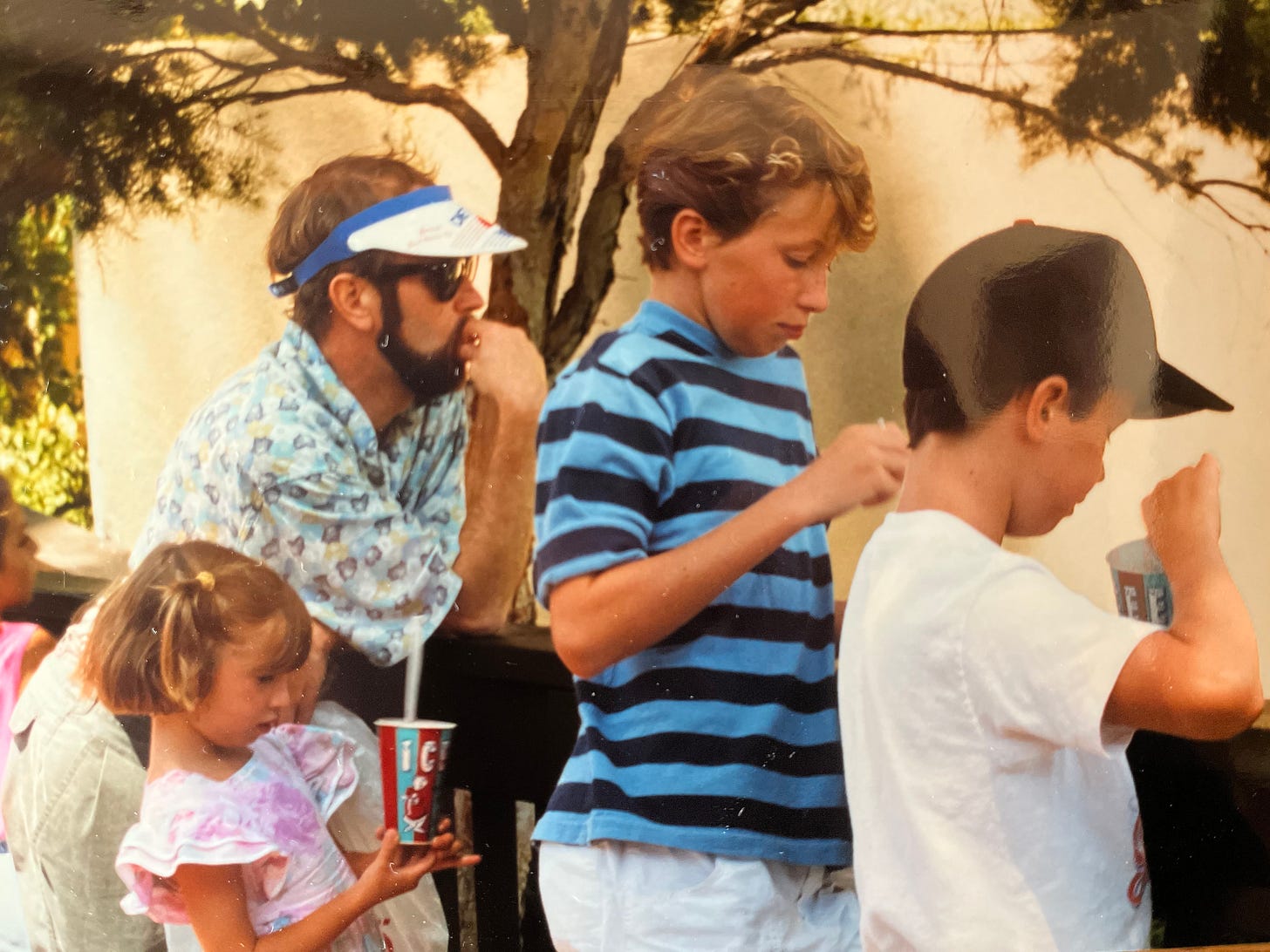
My Dad has always had a strong critique of American exceptionalism. And yet at the same time, his story is undeniably American. Lured by love of my Mom, and inspired by the Beatles’ triumphant British cultural invasion, he—another Northern English working-class kid—came to America to pursue his dreams (my British relatives always call it America, entranced by the poetic largesse of the name). He and my Mom created a life as part of the bohemian middle-class that was a pillar of pre-tech San Francisco. He made it. And yet he could still critique the excesses of his newly adopted country and not fear being deported. (He eventually became a citizen so he could vote twenty years ago).
I toggle back and forth between diving deep into the news and wanting to completely check out. Yet we will not hold of autocracy thru self- care. It was ample inspiration watching my nine-year old Winston pitch his first innings of a baseball game. His long hair flapping in the wind, he took deep breaths after walking two batters in a row. Then he got back on the mound and threw three more high arcing strikes to retire the side. If he can keep calm and carry on, so can I.
This last year, I’ve been teaching the Journalistic Theater process to students (age range 15-80) at Mendocino College. They went out and talked to people all over their county. A migrant couple falling in love as teenagers in the pear orchards of Hopland in the ‘80s and eloping back to Mexico. A trans kid cracking their egg in a rural town and realizing they don’t need to play first person shooter games as their anger has subsided. A former Army captain and Iraq War veteran who became a water rights lawyer after seeing the importance of clean water to community’s survival while serving in Iraq.
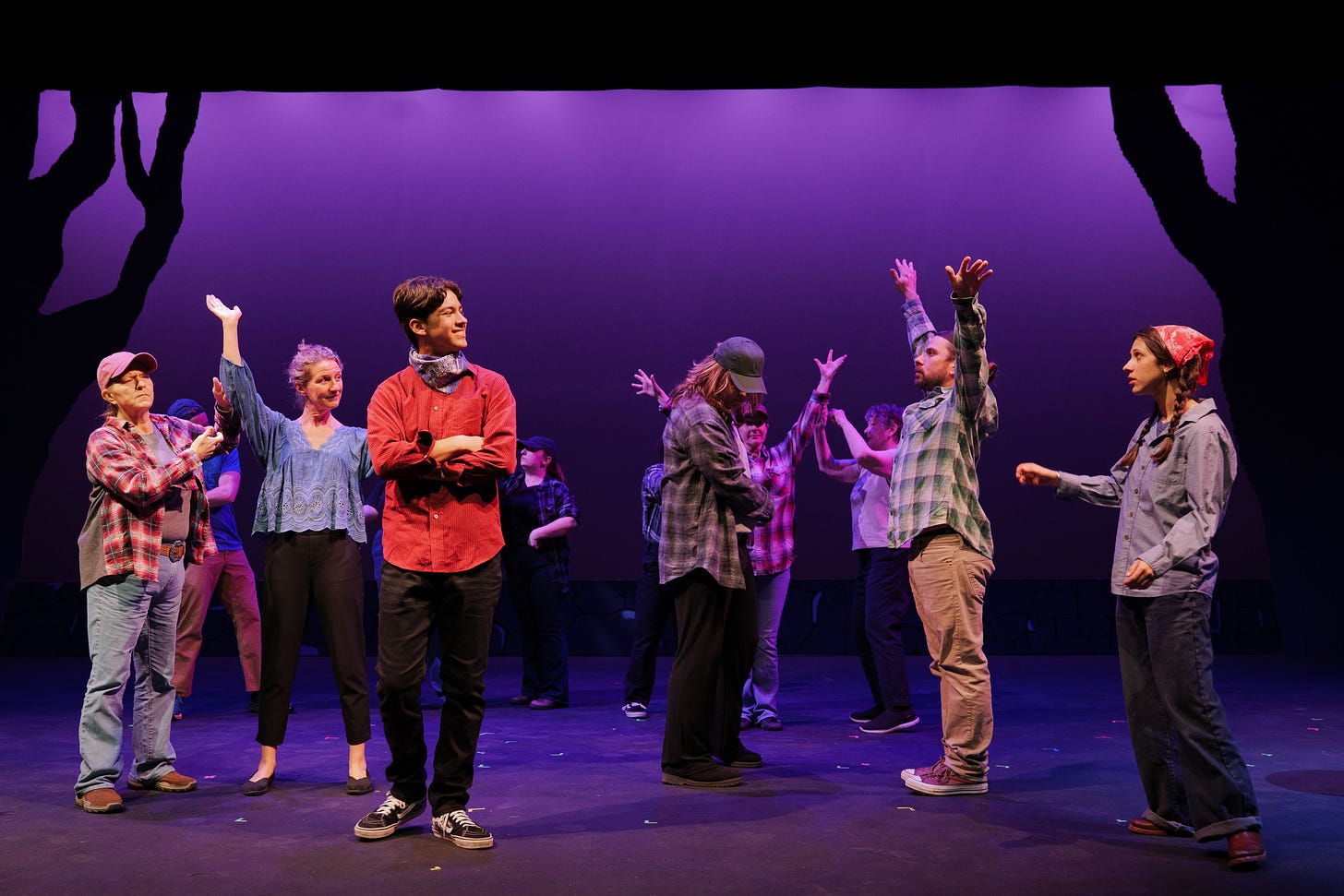
I wrangled the script, from dozens of interviews and conversations. Then for two months, working under the inspired direction of my talented comrade (and journalistic theater convert) Lucas Near-Verbrugghe, and produced by Reid Edelman, they turned these stories into stunning theatrical vignettes. Watching seven actors create a truck that an old hippie bought in Oregon in the 70s, or transform to embody a pear orchard, or a wedding dance party in Mexico, I felt shivers. There is something audacious about going out into one’s community and listening to everyday stories and transforming them into art. There’s a resilience in the form that matches the content. Community is not only a coping mechanism, it is power. As the narrator of the night wryly jokes, “the State of California paid to lead a story gathering class. At least there’s some programs too essential to cut.”
The narrator, who is playing an older male rancher (but is played by a woman who is married to another old rancher in real life) later delivers the other piece of cowboy philosophy. “I looked up the word community. It said a community interacts with each other. A society just is. A community does.”
As it happened, I was sitting on the side of one the community members whose story is told in the show. I could see the grin spread across her face as her story was embodied, and stay wide and full the entire scene, as though she had just been slipped a drug. I struggled to not tear up seeing that joy.
Part of the intent of the current political takeover is to overwhelm us, to render us numb. To make us unable to do anything in response, to lose our will, and our humanity. Journalistic theater quite simply helps restore our humanity. As does all intentional congregating and witnessing and creating in community. It sounds like April 5th will be a National Day of protest. Maybe I will see you out there. I will be relishing the sounds of solidarity.




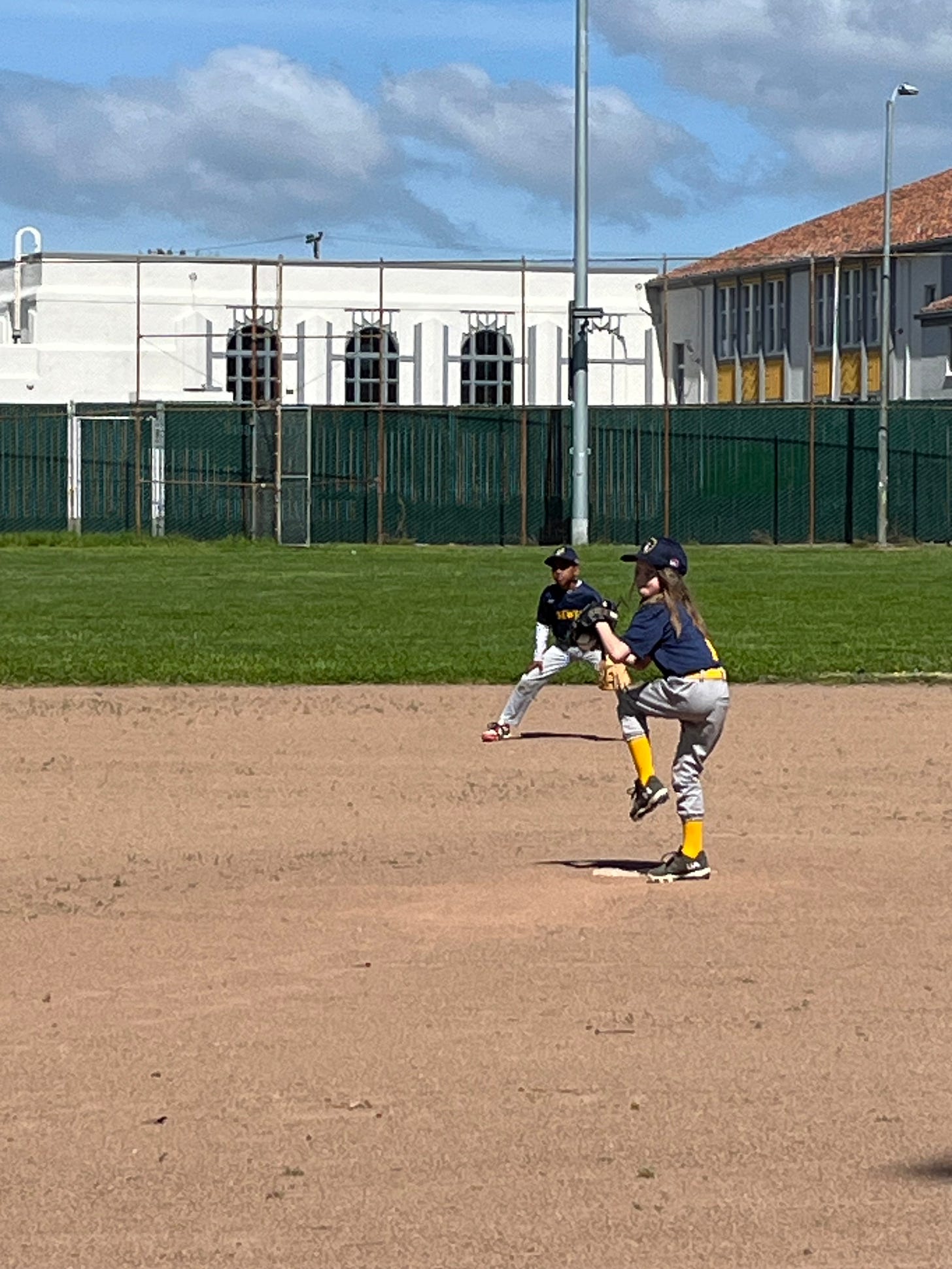
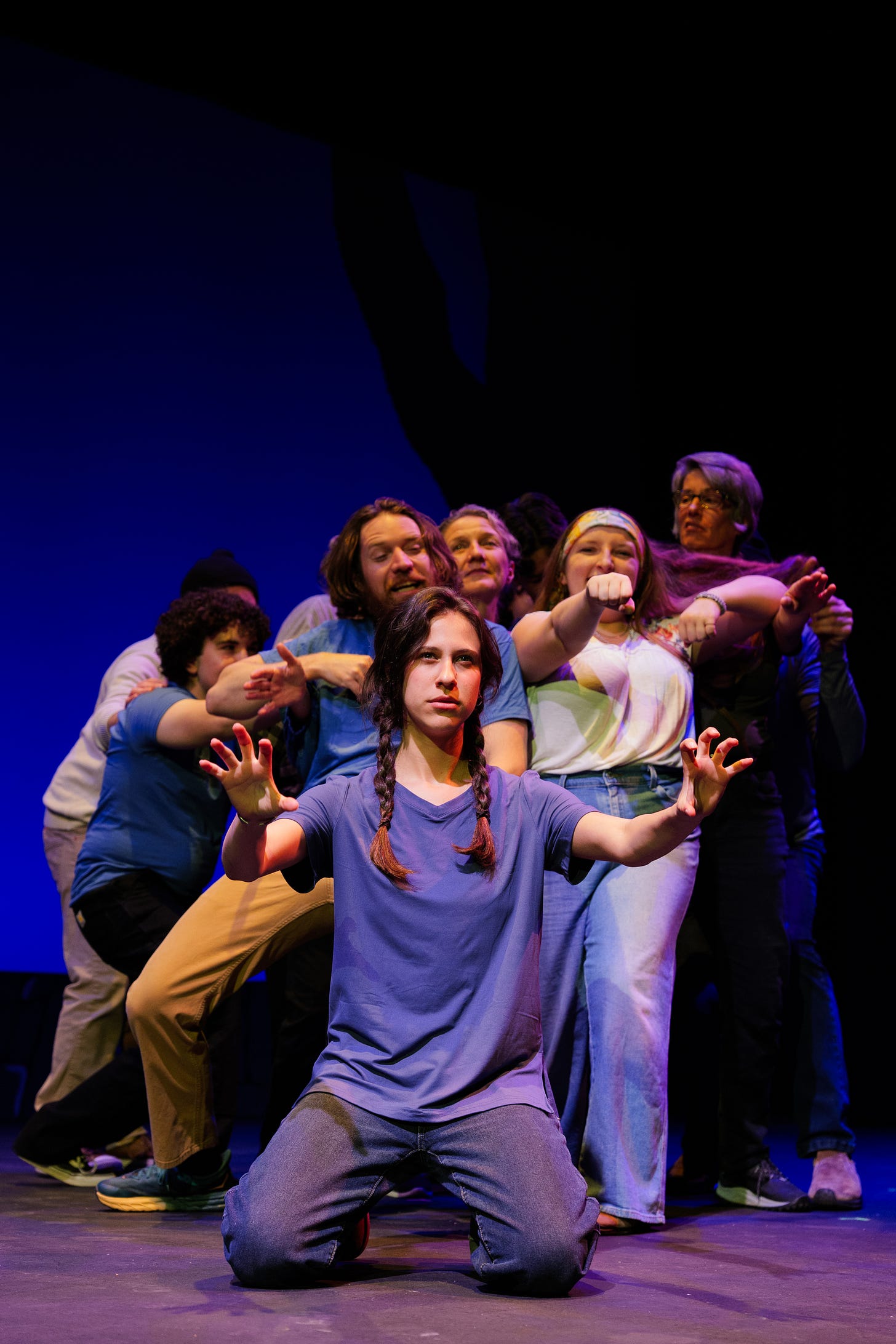
Thank you for this.
Thanks Dan. Wow. ❤️